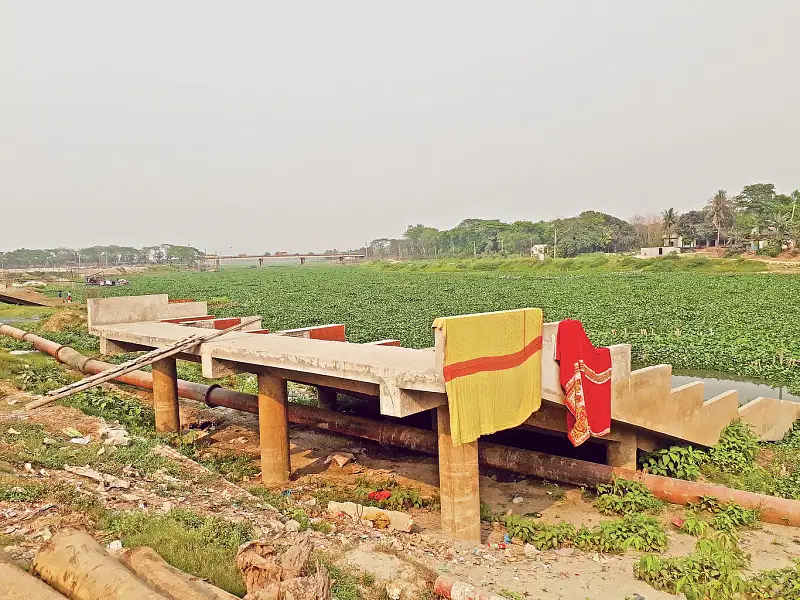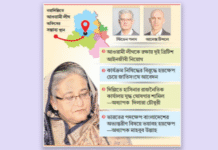
The ‘Infrastructure improvement of Langhandh maha ashtami holy bathing festival project’ was supposed to be completed in a coordinated manner.
But three different wings of the government took up separate projects, resulting in amplification of the total project cost at around Tk1,500 crore (Tk 15 billion).
This development extravaganza is now considered as another example of ‘whimsical’ projects by the government.
According to official documents, the local government engineering department (LGED) took up a project worth Tk121 crore (Tk1.21 billion) to build the ghats (jetty-like platforms), a shade, parking lot, toilets and some other facilities for the Langalbandh pilgrilms.
The road transport and bridges ministry took up another project worth Tk260 crore (Tk2.60 billion) to widen the connecting road and public works department took a Tk100 (Tk1 billion) crore project to build a hotel, theme park, amphitheater and other accessory establishments.
So far, LGED has spent Tk58 crore (Tk580 million) at its project.
The prime minister’s office (PMO), however, has directed to halt the LGED project midway as a fresh decision would require a comprehensive design on the whole project before resuming the development work.
In reality, pilgrims have yet to get improved infrastructure facilities at Langalbandh over last six years despite the prime minister orders to implement these.
Completion of the project is still uncertain.
On 27 March, 2015, a rumour of the collapse of a portable steel bridge on Langalbandh-Chasara Road resulted in 11 pilgrims being stampeded on the spot.
The accident drew the attention of the prime minister who later ordered the concerned departments and agencies to improve the infrastructure facilities of this religious place.
Every year, on the eighth day of moon of the Bangla month Chaitra, hundreds of thousand Hindus from across the country and abroad visit Langalbandh ghat to bathe in the ‘holy’ water of the River Brahmaputra.
Concerned people think that some government wings took the project with vested interests. Moreover, the total project cost was amplified to Tk1,500 crore by adding fancy components instead of necessary ones to the project. The PMO has also raised the concern.
An inter-ministerial meeting on the Langalbandh project was held on 7 December 2020. According to minutes of the meeting, the then PMO secretary Sajjadul Hassan repeated the prime minister’s orders to build essential infrastructures only at Langalbandh.
He suggested dropping the ideas of fancy components like the hotel, rest house, amphitheater and other things from the project. The secretary slammed the disorganised development work at Langalbandh that were disturbing the Brahmaputra water flow.
6 years of the project
On 1 June, 2015, the PMO assigned the public works department and architecture department to submit an attractive design of the Langalbandh project to the local government division within one month. It was decided that the LGED would facilitate the construction works while the roads and highways department would widen the road connecting Langalbandh with Minarbari, and the Bangladesh Inland Water Transport Authority would dredge 11km of the Brahmaputra at Langalbandh.
Even though the architectural design was not prepared, LGED took up an infrastructure development project worth Tk121 crore. The executive committee of the national economic council (ECNEC) approved the project in January 2017. The project is scheduled to be completed by June 2022.
The road transport and bridges ministry took up a project of widening around 3.75km road from Langalbandh to Minarbari. The initial project cost was Tk121.57 crore and the project tenure was February 2017-June, 2018. An extension of the project tenure helped little. In July 2020, the project cost was revised as Tk139 crore and the project got an extended period to December 2021. Officials said the estimated cost grew because of increased price of land. However, the project implementing authority has yet to initiate land acquisition.
On the other hand, the public works department submitted proposal of another project to the concerned ministry in 2020. The project cost was estimated Tk1100 initially.
PWD’s Dinajpur circle superintended engineer Muhammad Zakir Hossain, who worked as an executive engineer at PWD’s Narayanganj circle when the Langalbandh project proposal was underway, said the whole project should have implemented in a coordinated manner. “LGED took up a small-scale project too hurriedly,” he said.
Requirement of a new design
The planning commission rejected the draft project proposal from the PWD, citing two other under-implementation projects. The commission stressed for coordination among the three parties related to the Langalbandh project.
The government then formed an inter-ministerial committee to bring coordination in the project.
The committee held a meeting on 7 December last year, decided to relieve the PWD from drafting a design of the project. The meeting was chaired by the principal secretary Ahmad Kaikaus.
The committee decided that LGED will draft a mega plan with consultancy from the architectural department. “Soon after the mega plan is finalised, the development work will start,” the committee concluded.
LGED project director Gautam Prashad Chowdhury told Prothom Alo that LGED would revise its under-implementation project according to the mega plan.
The LGED project has made 52 per cent progress. Construction of eight out of the proposed 15 ghats have been completed already while the parking area is almost complete.
As the new directive came regarding the mega plan, LGED project implementation have been halted for the last six months.
In a recent visit to Langalbandh, a dormitory and five ghats under the LGED project were found incomplete while the construction materials were dumped haphazardly.
The Langalbandh holy bath management committee’s general secretary, Sujit Saha, regretted the delays in the infrastructure improvement project implementation.
“We demand quick implementation of the project,” he said.
Project-related officials said that the some ghats, whether completed or not, would need to be reconstructed and connected with each other as per the mega plan.
Adil Mohammed Khan, general secretary of Bangladesh Institute of Planners, labeled the Langalbandh project as a great example of the lack of coordination among the government wings.
“Every wing officials think that getting approval of a new project will benefit them. But the prime minister’s order was to properly facilitate the pilgrims with necessary infrastructure. With this simple idea in mind, the project could be taken up as easily as possible,” Adil said.
This report appeared in the print and online edition of Prothom Alo and has been rewritten for the English edition by Sadiqur Rahman









